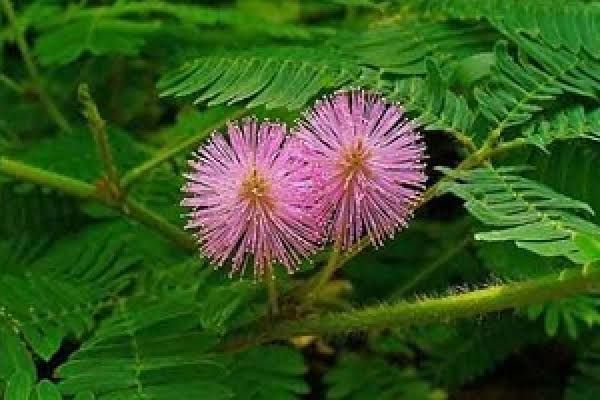
Bismillahir Rahmanir Raheem.
Assalamu Alaikum Wa Rahmatullahi Wa Barakatuhu.
Dear fellow friends, I hope you are all well, I am also well and healthy by the grace of Allah through your prayers. Welcome and congratulations to all of you in today's post.
Lajyavati: An Overview of its Habitat, Climate, and Medicinal Uses
Lajyavati, scientifically known as Mimosa pudica, is a perennial herb that belongs to the family Fabaceae. It is commonly referred to as the "sensitive plant" due to its unique characteristic of folding its leaves when touched. This plant is not only fascinating due to its responsive movements but also holds significant medicinal value in traditional and modern medicine. This essay will discuss the regions where Lajyavati is commonly found, the climate it thrives in, its medicinal properties, and the diseases it is used to treat.
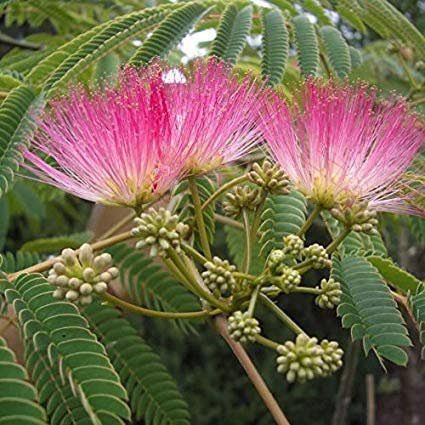
source
Habitat and Geographic Distribution
Lajyavati is native to South America and Central America but has become naturalized in many other regions, including Asia, Australia, and parts of Africa. It is commonly found in tropical and subtropical regions, thriving in disturbed areas, roadsides, gardens, and fields. This plant prefers well-drained soils and can often be seen in sandy and loamy soils with a neutral pH. It grows well in areas with full sunlight or partial shade, making it a versatile plant that can adapt to various environments.
In India, Lajyavati is widely distributed and can be found in states like Maharashtra, Kerala, Tamil Nadu, and Karnataka. It is also present in other Southeast Asian countries such as Thailand, Malaysia, and Indonesia. The plant’s ability to adapt to different environmental conditions has contributed to its wide distribution across the globe.
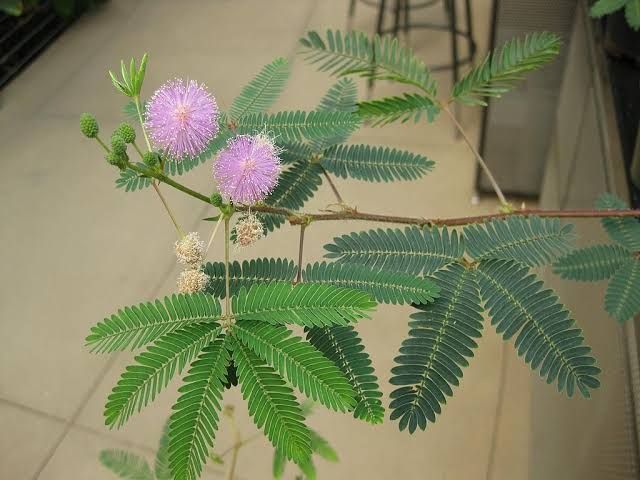
source
Climate and Growing Conditions
Lajyavati thrives in warm, humid climates typical of tropical and subtropical regions. The plant prefers temperatures ranging from 25°C to 30°C (77°F to 86°F) but can tolerate temperatures slightly above or below this range. It requires a good amount of rainfall, ideally between 1500 mm to 2500 mm annually, for optimal growth. However, it can also withstand periods of drought due to its deep-rooted system which helps in accessing water from deeper soil layers.
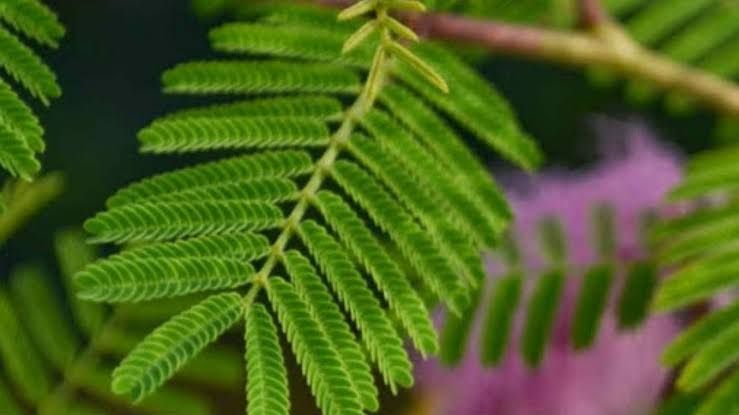
source
The plant grows best in areas that receive full sunlight, although it can also grow in partially shaded regions. Soil moisture is crucial for the plant’s growth, and it prefers well-drained soils to prevent waterlogging, which can damage the roots. In terms of soil type, Lajyavati is not very demanding and can grow in sandy, loamy, and clay soils, although it flourishes best in well-drained, fertile soils.
Medicinal Properties
Lajyavati has been extensively studied for its medicinal properties, which are utilized in traditional medicine systems like Ayurveda, Unani, and traditional Chinese medicine. The plant contains various bioactive compounds, including alkaloids, flavonoids, glycosides, tannins, and phenolic compounds, which contribute to its therapeutic effects.
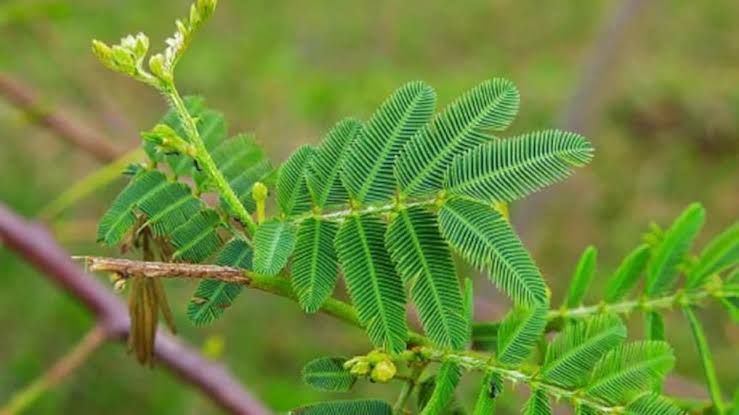
source
Anti-inflammatory and Antioxidant Properties: The leaves and roots of Lajyavati are rich in compounds that exhibit significant anti-inflammatory and antioxidant activities. These properties help in reducing inflammation and oxidative stress in the body, making it useful in treating conditions like arthritis and other inflammatory diseases.
Antimicrobial Activity: Lajyavati has been found to possess antimicrobial properties effective against a variety of bacteria and fungi. This makes it useful in treating infections and promoting wound healing.
Antidiabetic Effects: Studies have shown that extracts from Lajyavati can help in lowering blood glucose levels, making it beneficial for managing diabetes. The plant's ability to enhance insulin sensitivity and reduce blood sugar levels is of particular interest in diabetic research.
Hepatoprotective Properties: The plant has shown promise in protecting the liver from damage caused by toxins, drugs, and other harmful agents. This hepatoprotective effect is attributed to its ability to enhance the antioxidant defense system and reduce liver enzymes indicative of liver damage.
Anti-anxiety and Antidepressant Effects: Traditional medicine has used Lajyavati to alleviate symptoms of anxiety and depression. Modern studies have supported these uses, showing that the plant's extracts have anxiolytic and antidepressant properties.
Medicinal Uses and Applications
Wound Healing: The leaves of Lajyavati are used in poultices to treat wounds, cuts, and abrasions. Its antimicrobial and anti-inflammatory properties help in preventing infection and promoting faster healing.
Digestive Health: The plant is used to treat various digestive issues such as diarrhea, dysentery, and intestinal worms. The roots and leaves are often used to make decoctions that aid in soothing the digestive tract and eliminating pathogens.
Respiratory Disorders: Lajyavati is beneficial in treating respiratory conditions like asthma, bronchitis, and cough. The plant's anti-inflammatory properties help in reducing inflammation in the respiratory tract and easing breathing.
Urinary Problems: The plant is used to treat urinary tract infections and other urinary disorders. Its diuretic properties help in flushing out toxins and promoting the health of the urinary system.
Pain Relief: Due to its analgesic properties, Lajyavati is used to alleviate various types of pain, including headaches, toothaches, and body aches. The plant's extracts can be applied topically or consumed to provide relief from pain.
Reproductive Health: In traditional medicine, Lajyavati is used to address various reproductive health issues, including menstrual disorders and infertility. It is believed to have properties that help in regulating menstrual cycles and enhancing fertility.
Skin Care: The plant's extracts are used in treating skin conditions like acne, eczema, and rashes. Its anti-inflammatory and antimicrobial properties help in reducing inflammation and preventing infections.
source
Lajyavati (Mimosa pudica) is a remarkable plant with a wide range of medicinal uses. Its ability to thrive in various climates and soils has contributed to its widespread availability. The plant's diverse medicinal properties make it a valuable resource in traditional and modern medicine. From treating infections and inflammation to managing diabetes and promoting mental health, Lajyavati offers numerous health benefits. Continued research on this plant could lead to the development of new and effective treatments for various ailments, further highlighting the importance of preserving and studying medicinal plants like Lajyavati.
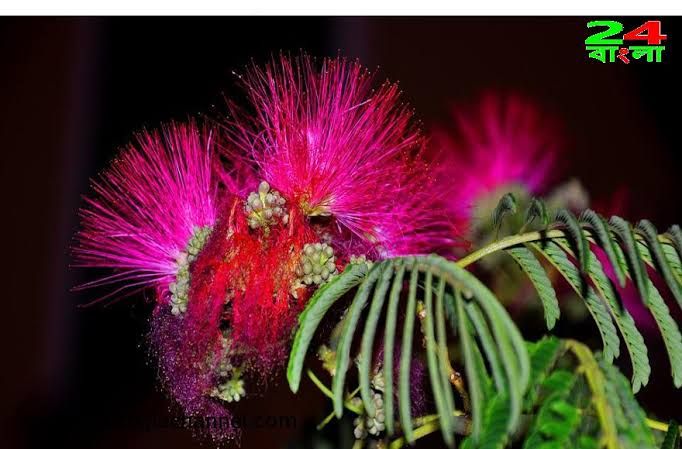
wow beautiful ❤️
Thank you so much for share.